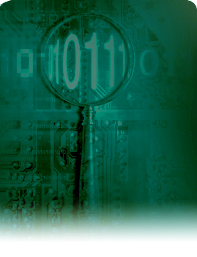


PAPERS
BEST PAPER
The ICoFCS Committee chose the paper "Raciocínio Baseado em Casos Aplicado em Análise Live" as the best paper of the conference.
The paper was written by Frederico Imbroisi Mesquita, Bruno Werneck Pinto Hoelz, and Celia Ghedini Ralha, and will open the ICoFCS 2011, on October 5th, 2011, at 02:40pm.
See the Best Paper abstract:
"A presença de conteúdo criptografado ou de um grande volume de informações a serem periciados são os novos desafios da perícia digital convencional. A análise live pode ser utilizada para garantir o acesso ao conteúdo do disco rígido e realizar a triagem de dados e equipamentos ainda em execução. Porém, trata-se de uma perícia digital complexa devido a grande quantidade e variedade de informações a serem analisadas em curto período de tempo. Este artigo apresenta uma arquitetura com foco na abordagem de Raciocínio Baseado em Casos, a qual utiliza conhecimentos adquiridos em casos similares anteriores para solução de casos atuais. A partir da definição arquitetural foi implementado e testado um protótipo com a utilização de casos reais do Departamento de Polícia Federal (DPF), simulados em máquinas virtuais. Durante os experimentos realizados foram identificadas repetições de 84% nos processos em execução e o protótipo apresentou bons resultados no reconhecimento de ameaças e oportunidades durante a análise de equipamentos computacionais ligados, sugerindo procedimentos periciais adicionais em cerca de 76% dos casos simulados."
RUNNER-UP
The paper "Computer Forensic Document Clustering with ART1 Neural Networks", written by Georger Rommel Ferreira de Araújo, and Célia Ghedini Ralha, is the runner-up paper of the conference.
See the Runner-Up Paper abstract:
"Computer forensic text corpora are usually very heterogeneous. While classification, by file type or other criteria, should be an aid in the exploration of such corpora, it does not help in the task of thematically grouping together documents. Adaptive Resonance Theory (ART) describes a number of self-organizing artificial neural networks that employ an unsupervised learning process and is specially designed to learn new patterns without forgetting what it has already learned, overcoming the important restriction defined by the stability/plasticity dilemma. In this direction, this paper applies the ART1 algorithm (ART with binary input vectors) to thematically cluster documents returned from query tools used with forensic text corpora. Documents that would previously be presented in a disorganized and often long list are thematically clustered, giving the examiner a faster and effective way of obtaining a general picture of document content during forensic examinations. Our experimental results are expressive to validate our approach, achieving high agreement between the clustering solution processed with our software package and the gold standard defined by domain area experts."
The ICoFCS Committee chose the paper "Raciocínio Baseado em Casos Aplicado em Análise Live" as the best paper of the conference.
The paper was written by Frederico Imbroisi Mesquita, Bruno Werneck Pinto Hoelz, and Celia Ghedini Ralha, and will open the ICoFCS 2011, on October 5th, 2011, at 02:40pm.
See the Best Paper abstract:
"A presença de conteúdo criptografado ou de um grande volume de informações a serem periciados são os novos desafios da perícia digital convencional. A análise live pode ser utilizada para garantir o acesso ao conteúdo do disco rígido e realizar a triagem de dados e equipamentos ainda em execução. Porém, trata-se de uma perícia digital complexa devido a grande quantidade e variedade de informações a serem analisadas em curto período de tempo. Este artigo apresenta uma arquitetura com foco na abordagem de Raciocínio Baseado em Casos, a qual utiliza conhecimentos adquiridos em casos similares anteriores para solução de casos atuais. A partir da definição arquitetural foi implementado e testado um protótipo com a utilização de casos reais do Departamento de Polícia Federal (DPF), simulados em máquinas virtuais. Durante os experimentos realizados foram identificadas repetições de 84% nos processos em execução e o protótipo apresentou bons resultados no reconhecimento de ameaças e oportunidades durante a análise de equipamentos computacionais ligados, sugerindo procedimentos periciais adicionais em cerca de 76% dos casos simulados."
RUNNER-UP
The paper "Computer Forensic Document Clustering with ART1 Neural Networks", written by Georger Rommel Ferreira de Araújo, and Célia Ghedini Ralha, is the runner-up paper of the conference.
See the Runner-Up Paper abstract:
"Computer forensic text corpora are usually very heterogeneous. While classification, by file type or other criteria, should be an aid in the exploration of such corpora, it does not help in the task of thematically grouping together documents. Adaptive Resonance Theory (ART) describes a number of self-organizing artificial neural networks that employ an unsupervised learning process and is specially designed to learn new patterns without forgetting what it has already learned, overcoming the important restriction defined by the stability/plasticity dilemma. In this direction, this paper applies the ART1 algorithm (ART with binary input vectors) to thematically cluster documents returned from query tools used with forensic text corpora. Documents that would previously be presented in a disorganized and often long list are thematically clustered, giving the examiner a faster and effective way of obtaining a general picture of document content during forensic examinations. Our experimental results are expressive to validate our approach, achieving high agreement between the clustering solution processed with our software package and the gold standard defined by domain area experts."
